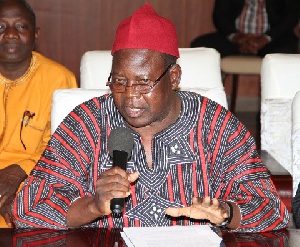A move by new Auditor General Daniel Yaw Domelevo to start surcharging public officers who are proven to have misapplied state funds is a step in the right direction, Vitus Azeem, an anti-graft campaigner and former Executive Director of the Ghana Integrity Initiative (GII) has said.
Mr Domelevo, who was appointed by President John Mahama in December 2016 before the National Democratic Congress (NDC) left office, told Moro Awudu on the Thinking Ahead segment of the Executive Breakfast Show, a collaboration between Class91.3FM and the Association of Chartered Certified Accountants (ACCA), that under his tenure his office would elect to sanction abusers of public funds rather than lament to parliament about such crimes as has persisted in the past.
“If you are familiar with the 2013 Auditor General’s report, there was a lamentation to parliament that it seems we bring this to the attention of parliament every year but the more we bring it to your attention, the more it is happening. There is more or less ‘a culture of impunity’ – as you complain about it, they are doing it.
“So the Ghana Audit Service under my leadership has decided that we are going to change the game. From now going the Auditor General is not going to complain to parliament anymore. But if you are conversant with the constitution, under Article 187 (7), it says that: ‘The Auditor General, in the course of discharging his duties, if he comes across an expenditure which is illegal or contrary to law, may disallow the expenditure and surcharge the amount to the officer responsible.’
“I’ve started that,” Mr Domelevo said, adding: “I’ve put up a team in my office. With immediate effect, they are being trained somewhere next week and we are going to start surcharging people.”
Speaking on the matter in an interview with Class FM’s Emefa Apawu on the 505 programme on Tuesday, February 21, Mr Azeem said: “That is what we have been expecting for a very long time. So it is a good idea, just that we have to take it slowly because from past experience there were a lot of problems involved in doing that. It is very welcome and let us give him the benefit of the doubt and hope that he will do that.
“If this gentleman has come and he is determined to do it, let us give him the benefit of the doubt. I think we should not always jump to the suspicious conclusion that it will not work. Let us give him the benefit of the doubt. We will hold him accountable to the comments that he has made. If nothing is happening, then we can always say that when you came you promised this and so what is happening?”
General News of Thursday, 23 February 2017
Source: classfmonline.com
Surcharging criminal public officers apt - Azeem
Entertainment












